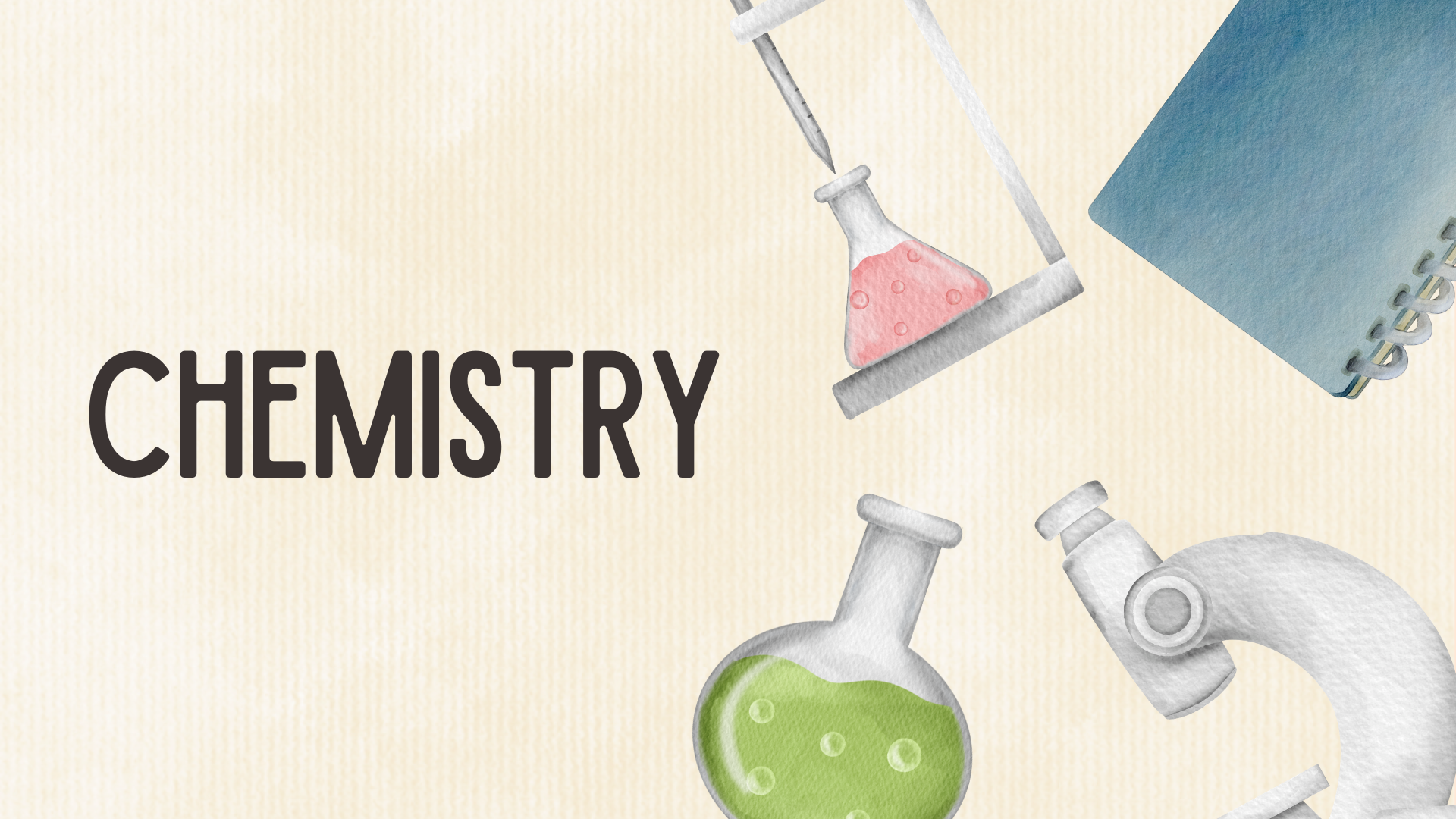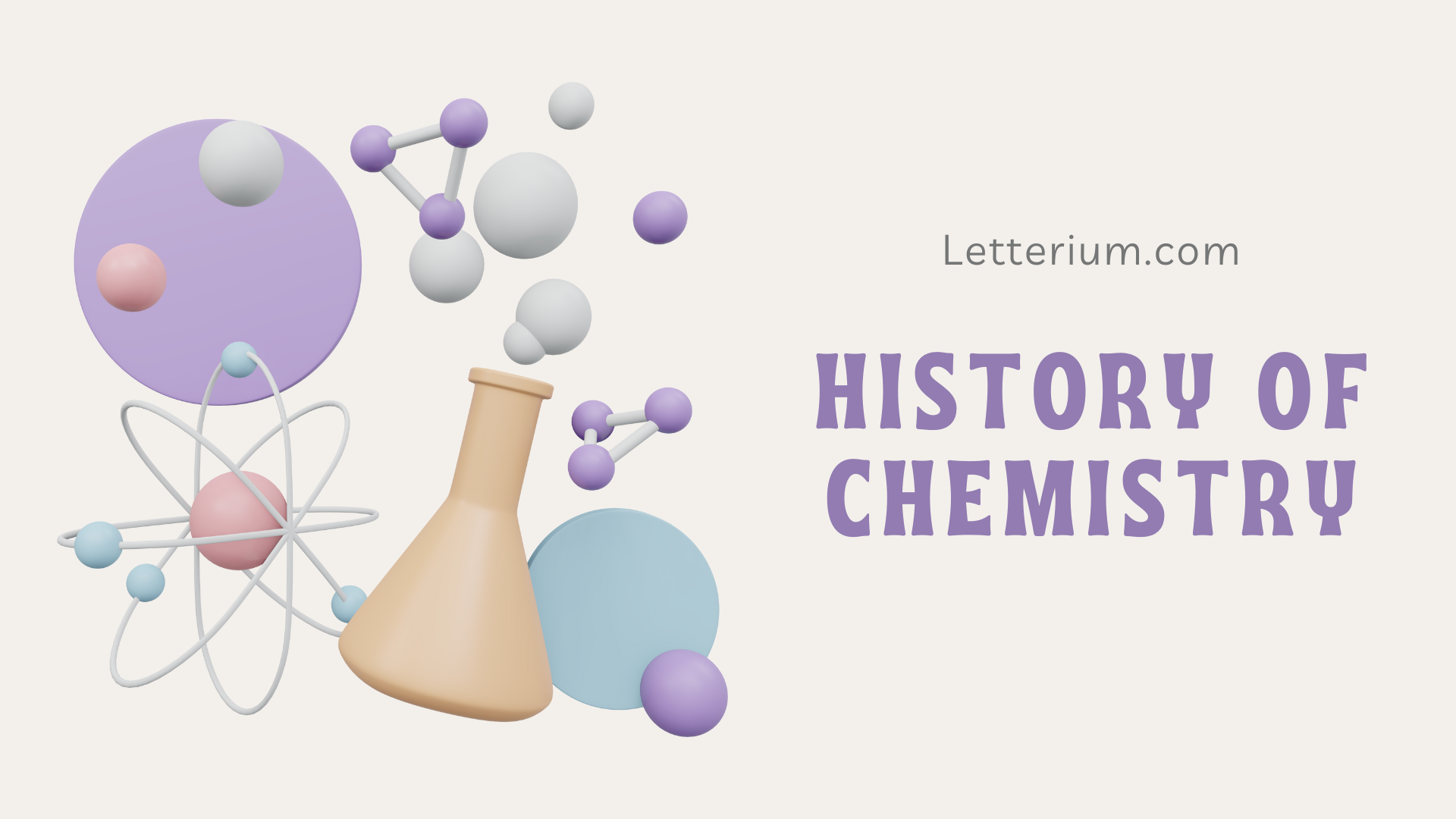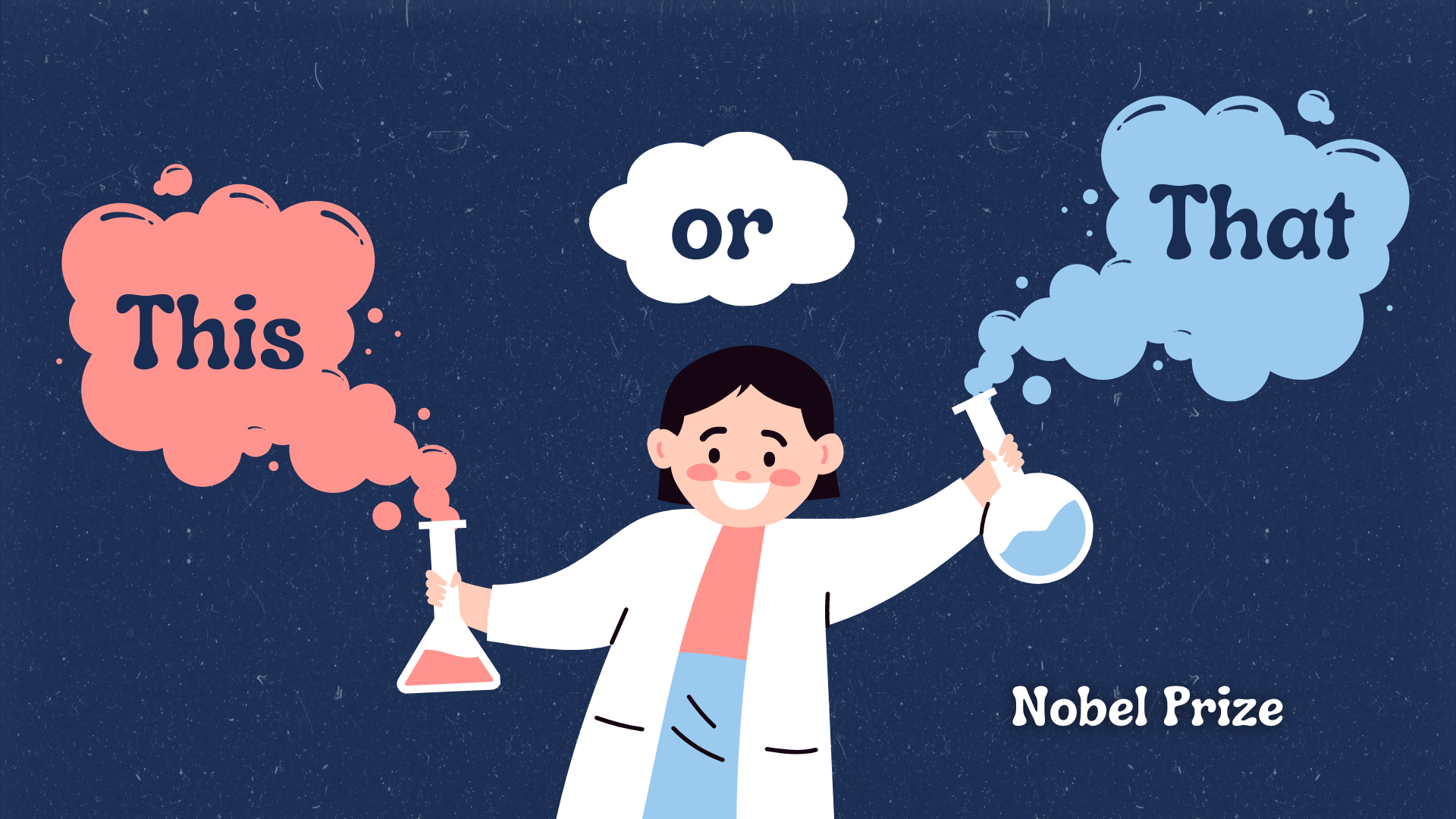Chemistry stands as the scientific study delving into the essence, behavior, and transformation of matter. It stretches across various branches including organic, inorganic, physical, analytical, biochemistry, and theoretical chemistry, each focusing on unique aspects of matter and its interactions. Central concepts such as atoms, molecules, chemical bonds, reactions, and the periodic table are foundational to understanding chemical processes. Tracing its origins to ancient practices and the pursuit of alchemy, chemistry evolved through significant discoveries like oxygen, paving the way for modern scientific inquiry. Today, chemistry's applications are vast and integral to numerous fields such as medicine, environmental science, materials science, and energy, showcasing its pivotal role in advancing technology, improving health, and solving environmental issues.
What is Chemistry?

Chemistry is a branch of science that deals with the study of the composition, structure, properties, and changes of matter. It explores the substances that make up the world around us, from the simplest elements to complex compounds, and investigates how these substances interact with each other through chemical reactions. Chemistry is fundamental to understanding the natural universe, as it provides insights into the materials that constitute our environment and how these materials can be transformed.
At its core, chemistry seeks to understand the behavior of atoms and molecules, the basic building blocks of matter. By examining how atoms combine to form molecules and how molecules interact with one another, chemists can predict and manipulate chemical reactions to produce new substances with desired properties.
Chemistry is divided into several sub-disciplines, including organic chemistry, which focuses on carbon-containing compounds; inorganic chemistry, which deals with inorganic substances; physical chemistry, which combines chemistry with physics to study the physical properties of molecules; analytical chemistry, which involves analyzing substances to determine their composition; and biochemistry, which examines the chemical processes occurring within living organisms.
Through its applications in fields such as medicine, materials science, environmental science, and energy production, chemistry plays a crucial role in addressing many of the world's challenges and improving our quality of life.
Branches of Chemistry
Chemistry is a vast field that encompasses several branches, each focusing on different aspects of the matter and its properties. The main branches of chemistry include:
- Organic Chemistry: This branch focuses on the study of carbon-containing compounds, along with their structure, properties, synthesis, and reactions. It covers a wide range of compounds, including hydrocarbons and their derivatives. Organic chemistry is fundamental to the pharmaceutical, petrochemical, and polymer industries.
- Inorganic Chemistry: Inorganic chemistry deals with the properties and behavior of inorganic compounds, which do not contain carbon-hydrogen bonds. This includes metals, minerals, salts, and more. It plays a crucial role in industries like materials science, catalysis, and metallurgy.
- Physical Chemistry: This branch merges chemistry with physics to study the physical properties of molecules, the forces that act upon them, and their chemical reactions. It involves concepts from thermodynamics, quantum mechanics, and kinetics. Physical chemistry is essential for developing new materials and understanding the mechanisms of chemical reactions.
- Analytical Chemistry: Analytical chemistry involves the analysis of substances to determine their composition and the structure of chemical compounds. It employs techniques such as spectroscopy, chromatography, and electrochemistry. This branch is crucial for quality control, environmental monitoring, and forensic science.
- Biochemistry: Biochemistry examines the chemical processes and substances that occur within living organisms. It bridges biology and chemistry, focusing on enzymes, DNA, proteins, and cell metabolism. Biochemistry is vital for understanding diseases, drug development, and genetics.
- Theoretical Chemistry: This branch uses mathematical models and computational methods to understand the principles of chemistry. Theoretical chemistry helps in predicting the properties of new compounds and elucidating chemical reactions' mechanisms.
- Environmental Chemistry: Environmental chemistry studies the chemical and biochemical phenomena that occur in natural places. It focuses on the effects of chemicals in the environment, pollution, and the chemical processes that occur in the earth's atmosphere, oceans, and soil.
- Materials Chemistry: Materials chemistry involves the synthesis and study of materials with interesting or potentially useful physical characteristics, such as magnetic, optical, structural or catalytic properties. It plays a crucial role in nanotechnology, electronics, and the development of new materials for various applications.
Each of these branches overlaps with others to some degree, reflecting the interdisciplinary nature of chemistry. Together, they provide a comprehensive understanding of the material world and the changes that matter undergoes.
Key Concepts in Chemistry
Chemistry is founded on several key concepts that form the basis for understanding the behavior of matter and its interactions. These concepts are central to all branches of chemistry and provide the framework for explaining chemical phenomena:
- Atoms and Elements: Atoms are the basic units of matter, consisting of a nucleus surrounded by electrons. Elements are pure substances made up of only one type of atom, characterized by a specific number of protons in their nuclei.
- Molecules and Compounds: Molecules are groups of two or more atoms bonded together. Compounds are substances formed when atoms of two or more different elements combine in fixed ratios. Molecules can consist of the same element (e.g., O2) or different elements (e.g., H2O).
- Chemical Bonds: Chemical bonds are the forces that hold atoms together in molecules or compounds. The main types of chemical bonds include ionic bonds, formed by the transfer of electrons between atoms; covalent bonds, formed by the sharing of electrons; and metallic bonds, found in metals, involving a sea of delocalized electrons.
- Chemical Reactions: Chemical reactions involve the rearrangement of atoms to transform reactants into products. This process involves breaking old bonds and forming new ones, accompanied by energy changes.
- The Periodic Table: The periodic table organizes all known chemical elements based on their atomic number, electron configuration, and recurring chemical properties. Elements are arranged in rows (periods) and columns (groups) with similar chemical behaviors.
- Stoichiometry: Stoichiometry is the calculation of reactants and products in chemical reactions. It is based on the conservation of mass and the concept of moles, a unit that measures the amount of substance.
- Solutions and Mixtures: Solutions are homogeneous mixtures where one substance (the solute) is dissolved in another (the solvent). Mixtures can be homogeneous (solutions) or heterogeneous, where the components remain distinct.
- Acids, Bases, and pH: Acids are substances that donate protons (H+ ions) in solutions, while bases accept protons. The pH scale measures the acidity or basicity of a solution, with 7 being neutral, values below 7 acidic, and above 7 basic.
- Thermodynamics: Thermodynamics deals with the study of energy changes, especially heat, in chemical reactions and physical transformations. It includes concepts like enthalpy, entropy, and Gibbs free energy.
- Kinetics: Chemical kinetics studies the rates of chemical reactions and the factors that affect them, such as temperature, concentration, and the presence of catalysts.
- Equilibrium: Chemical equilibrium occurs when the rates of the forward and reverse reactions are equal, leading to a constant composition of the reaction mixture over time.
These concepts are foundational to the study and practice of chemistry, enabling scientists to understand and predict the outcomes of chemical reactions, design new materials and processes, and explore the molecular basis of biological systems and environmental phenomena.
History of Chemistry

The history of chemistry is a rich and complex narrative that spans thousands of years, evolving from ancient practices to the sophisticated, multidisciplinary science we know today. This journey can be broadly categorized into several key periods:
Ancient Origins
- Alchemy: The roots of chemistry can be traced back to alchemy, practiced in ancient Egypt, China, India, and the Islamic world. Alchemists aimed to transform base metals into noble metals like gold, discover the elixir of life, and create the philosopher's stone, believed to grant immortality and infinite wealth. While their goals were often mystical, alchemists developed practical techniques and experimental methods that laid the groundwork for modern chemistry.
- Early Practical Chemistry: Ancient civilizations applied chemical principles in metallurgy, pottery, dyeing, and medicine without a clear understanding of the underlying science. The Greeks, for instance, proposed early theories of matter, including the concept of the four elements (earth, air, fire, water) by Empedocles and the atomic theory by Democritus.
The Birth of Modern Chemistry
- 16th and 17th Centuries: The scientific revolution of the 16th and 17th centuries, marked by figures like Robert Boyle, who is often considered the father of modern chemistry, began to challenge alchemical traditions and emphasize empirical evidence. Boyle's work, including the publication of "The Sceptical Chymist" in 1661, advocated for the study of chemical substances and reactions using the scientific method.
- 18th Century: This period saw significant advancements, including the phlogiston theory, which attempted to explain combustion and oxidation, though it was later disproven. The foundation for modern chemical nomenclature and the discovery of important gases, such as oxygen by Joseph Priestley and Carl Wilhelm Scheele and its role in combustion by Antoine-Laurent de Lavoisier, were established during this time. Lavoisier is often credited with the transformation of chemistry from a qualitative to a quantitative science, leading to the demise of alchemy.
19th Century: The Age of Classification and Atomic Theory
- Dmitri Mendeleev: He developed the Periodic Table of Elements, predicting the properties of elements yet to be discovered, and organizing elements by atomic weight and chemical properties.
- Organic Chemistry Emerges: Friedrich Wöhler's synthesis of urea, an organic compound from inorganic materials, challenged the vitalism theory and marked the birth of organic chemistry.
- Atomic Theory: John Dalton proposed the modern atomic theory, which provided a scientific explanation for the law of conservation of mass, the law of definite proportions, and the law of multiple proportions.
20th Century: The Century of Quantum and Physical Chemistry
- Quantum Chemistry: The development of quantum mechanics revolutionized the understanding of atomic and molecular structures. Scientists like Niels Bohr, Erwin Schrödinger, and Werner Heisenberg contributed to the development of models that explain the behavior of electrons in atoms.
- Physical Chemistry: The study of chemical thermodynamics, kinetics, and the development of instruments for analysis propelled chemistry into a new era of research and application.
21st Century: Interdisciplinary Expansion
- Nanotechnology, Materials Science, and Biochemistry: Contemporary chemistry is highly interdisciplinary, merging with biology to explore the chemical basis of life, with physics to develop new materials at the nanoscale, and with environmental science to address global challenges.
The history of chemistry reflects humanity's enduring quest to understand and manipulate the material world. From its alchemical origins to the modern era of molecular biology and nanotechnology, chemistry continues to evolve, expanding our knowledge and enabling technological advancements that shape our daily lives and the future of our planet.
Applications of Chemistry
Chemistry's applications are diverse and integral to numerous aspects of human life and the environment. Its contributions span from health and medicine to energy, materials science, and beyond, illustrating the discipline's central role in advancing technology and improving quality of life. Here's an overview of some key areas where chemistry plays a vital role:
1. Health and Medicine
- Pharmaceuticals: Chemistry is crucial in the design and synthesis of drugs that treat various diseases and conditions. It enables the development of antibiotics, vaccines, analgesics, and cancer therapies.
- Medical Diagnostics: Chemical techniques are used to analyze biological samples for medical diagnosis, including blood glucose monitoring, cholesterol levels, and identifying pathogens.
- Biotechnology: Advances in chemistry have enabled the manipulation of biological systems for medical purposes, such as gene editing and the production of insulin and other biopharmaceuticals.
2. Energy
- Renewable Energy: Chemistry is key in developing and improving renewable energy sources, such as solar panels (photovoltaics) and biofuels, making energy production more sustainable.
- Batteries and Fuel Cells: Chemical innovations in lithium-ion batteries and hydrogen fuel cells are crucial for energy storage and the development of electric vehicles.
3. Materials Science
- Nanotechnology: Chemistry at the nanoscale has led to the creation of materials with unique properties, used in electronics, medicine, and environmental applications.
- Polymers and Plastics: Synthetic chemistry has revolutionized the production of polymers and plastics, with applications in packaging, construction, textiles, and medical devices.
- Smart Materials: Chemistry has enabled the development of materials that can change properties in response to external stimuli, such as temperature, light, or pressure.
4. Environmental Science
- Pollution Control: Chemistry is essential in developing methods to reduce and manage pollution, including air and water purification technologies and the remediation of contaminated sites.
- Sustainable Chemistry: Also known as green chemistry, it focuses on designing products and processes that minimize the use and generation of hazardous substances, reducing the environmental footprint of chemical manufacturing.
5. Food and Agriculture
- Food Safety and Preservation: Chemical techniques are used to ensure food safety, extend shelf life, and improve food quality through preservatives, antioxidants, and packaging technologies.
- Agricultural Chemistry: Chemistry contributes to the development of fertilizers, pesticides, and herbicides that increase crop yields and control pests, with a growing emphasis on sustainability and reducing environmental impact.
6. Manufacturing and Industry
- Chemical Engineering: The application of chemical principles in industrial processes to produce chemicals, fuels, drugs, food, and many other products.
- Catalysis: Chemical catalysts are essential for increasing the efficiency of industrial processes, including the production of fuels, plastics, and synthetic fibers.
7. Forensic Science
- Crime Scene Investigation: Analytical chemistry techniques are used to analyze evidence from crime scenes, such as drugs, toxins, and trace elements, aiding in criminal investigations.
8. Art and Conservation
- Art Restoration and Preservation: Chemistry helps in the preservation and restoration of artworks, analyzing materials and techniques used by artists, and developing methods to prevent deterioration.
Chemistry's widespread applications demonstrate its fundamental importance across all sectors of society, driving innovation and addressing challenges in health, environment, energy, and beyond. Its role in developing new solutions and improving existing technologies continues to expand, reflecting the dynamic and evolving nature of the field.
Nobel Prize in Chemistry Laureates

The Nobel Prize in Chemistry is awarded annually by the Royal Swedish Academy of Sciences to individuals who have made outstanding contributions to the field of chemistry. The prize, established by the will of Alfred Nobel in 1895, has been awarded since 1901. It honors those who have significantly advanced our understanding of chemical processes and substances, leading to discoveries that have profoundly impacted various aspects of science, technology, and industry.
Given the extensive history of the prize, listing all laureates would be exhaustive. However, here's a brief overview highlighting a few notable winners from different eras, showcasing the diversity and impact of their contributions:
Early 20th Century
- Marie Curie (1911): Awarded for her services to the advancement of chemistry by the discovery of the elements radium and polonium, by the isolation of radium and the study of the nature and compounds of this remarkable element.
Mid-20th Century
- Linus Pauling (1954): For his research into the nature of the chemical bond and its application to the elucidation of the structure of complex substances. Pauling is also known for his work in peace activism, for which he received the Nobel Peace Prize in 1962, making him one of the few individuals to receive Nobel Prizes in different fields.
- Dorothy Crowfoot Hodgkin (1964): Awarded for her determinations by X-ray techniques of the structures of important biochemical substances.
Late 20th Century
- Ahmed Zewail (1999): For his pioneering work on femtochemistry, using ultrafast lasers to observe the very fast reactions of molecules during chemical processes on the femtosecond timescale.
Early 21st Century
- Richard R. Schrock, Robert H. Grubbs, and Yves Chauvin (2005): For the development of the metathesis method in organic synthesis, a chemical reaction used in the manufacture of pharmaceuticals and advanced plastic materials.
- Frances H. Arnold (2018): Awarded half of the prize for the directed evolution of enzymes, with the other half shared by George P. Smith and Sir Gregory P. Winter for the phage display of peptides and antibodies.
Recent Years
The Nobel Prize in Chemistry continues to recognize groundbreaking work in various fields of chemistry, including advancements in theoretical chemistry, materials science, biochemistry, and environmental chemistry. For the most current list of laureates and their contributions, it's best to refer to the official Nobel Prize website, as it provides detailed information on the awardees and their impactful research.
These laureates exemplify the broad spectrum of chemistry's impact, from fundamental understanding of atomic structure to practical applications in medicine, materials, and beyond. The Nobel Prize in Chemistry highlights the critical role of chemistry in advancing knowledge and addressing global challenges.
Conclusion
The field of chemistry stands as a central pillar in the advancement of human knowledge and the improvement of our quality of life. Its branches, spanning organic, inorganic, physical, analytical, and biochemistry, among others, delve into the fundamental aspects of matter and its interactions, leading to discoveries that have revolutionized various sectors including health, energy, materials science, and environmental protection.
Key concepts such as atoms, molecules, chemical bonds, and reactions provide the foundational framework that underpins all chemical studies and applications. The history of chemistry, from its origins in alchemy to the modern era of quantum chemistry and nanotechnology, showcases the evolution of our understanding of the material world and our ability to manipulate it for the betterment of society.
The applications of chemistry are vast and impactful, touching every aspect of our lives. From the development of life-saving pharmaceuticals to the creation of sustainable energy solutions, the role of chemistry in driving innovation and addressing global challenges cannot be overstated. The Nobel Prize in Chemistry, awarded to individuals who have made significant contributions to the field, highlights the importance of chemistry in advancing science and technology.
In conclusion, chemistry is a dynamic and essential science that enriches our understanding of the universe, fuels technological progress, and plays a critical role in solving some of the most pressing issues facing the world today. Its ongoing advancements promise to continue shaping the future, making it an ever-important field of study and exploration.


 English
English 
